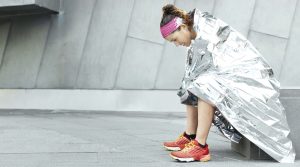The benefits of good sleep come into particular focus for athletes. Post-exercise recovery with extra sleep accelerates the building of muscle, strength, and endurance. Without proper sleep, athletes suffer from poorer reaction times, longer recovery times, and worsened performance.
HOW DOES SLEEP DEPRIVATION AFFECT ATHLETES?
Sleep deprivation for one night or two, or the accumulation of sleep debt over time (for example, from getting one less hour of sleep per night), impacts reaction time, attention and focus, and physical recovery for athletes. The body restores itself during sleep, so it is necessary for recovery from intense training. A person who is sufficiently well-rested will not waste any resources on staying awake or straining to stay focused and alert. Thus, their body and their mind can focus solely on their athletic performance.
While mild sleep deprivation does not negatively affect aerobic capacity, it does affect reaction time.
Even small amounts of fatigue can significantly reduce reaction time and degrade athletic performance. A 2000 study showed that pulling an all-nighter has a similar effect on reaction time as having a blood alcohol level of .05% – either scenario can cut reaction times by half.
This reduction in reaction time does not affect just performance and play; it also puts the athlete at greater risk of injury. A 2014 study in the Clinical Journal of Sports Medicine found that adolescents who played a game following a night of fewer than 8 hours of sleep were nearly twice as likely to get injured.
LACK OF SLEEP LENGTHENS ATHLETIC RECOVERY
Lack of sleep lengthens an athlete’s immediate recovery time and has detrimental long-term effects as well. In fact, if sleep issues are not addressed, they have the power to cut an athlete’s career short. In 2013, a study published in the American Academy of Sleep Medicine followed 80 Major League Baseball players over a period of three seasons. Their sleeping habits were recorded before the start of the 2010 season and ranked according to the Epworth sleepiness scale. Players who scored high for sleepiness were less than 40 percent likely to still be playing three seasons later, as compared with 72 percent of players who scored low on sleepiness.
SLEEP, STRESS, AND MENTAL FOCUS FOR ATHLETES
The effects of sleep deprivation are not isolated to physical performance. Lack of sleep also impacts an athlete’s mental focus, mood, and stress levels.
Anyone involved in endurance sports understands the power of a positive mindset. High performance athletes and Olympians frequently attribute part of their success to a strong visualization practice and positive attitude. Sleep deprivation has a strong impact on mood and can cause irritability that interferes with an athlete’s ability to think positive and “keep their head in the game.”
Studies indicate that sleep deprivation is linked to increased levels of cortisol, the stress hormone. Athletic performance already causes undue amounts of stress – adding to it is anything but helpful. Competitive athletes often have sleep onset insomnia before an important event, due to nervousness.
LESS SLEEP, LOWER ENERGY FOR ENDURANCE ATHLETES
Sleep deprivation has also been shown to inhibit production of glycogen and carbohydrates. These provide a critical source of energy during sustained athletic activity such as high-intensity weight-lifting or endurance events like marathons. If these stores are depleted, athletes will have less natural energy to rely on. As a result, they may rely increasingly on supplements that can have unexpected side effects.
These studies establish the importance of getting a quality night’s sleep if an athlete wishes to avoid risking athletic performance. The question then, is, does more sleep lead to better athletic performance? Some researchers say yes.
DO ATHLETES REQUIRE MORE SLEEP?
Research shows that athletic performance improves with sufficient sleep. Rested athletes are faster, more accurate, and have a quicker reaction time.
Stanford University’s Sleep Disorders Clinic and Research Laboratory has studied athletes from basketball, track and field, tennis, golf, and cross country. The evidence, usually based on small sample sizes, suggests more sleep results in improved physical performance.
HOW MUCH SLEEP SHOULD ATHLETES GET?
Trainers recognize the benefits of sufficient and even long sleep for athletes in heavy training. The recommended amount of sleep for an average adult is 7 to 9 hours per night. By contrast, adult athletes should get 10 hours in the weeks surrounding their training and competitive events, to ensure optimal performance as well as an efficient recovery. Adolescent athletes should aim for at least 9 hours.
If it’s not possible to get the full amount of sleep, naps can be a way to “make up” for the missed time, although they are far from an ideal solution. Naps should be kept to 30 minutes or less and should be avoided before practice or competition as they can cause sleepiness upon waking.
WHY IS SLEEP SO IMPORTANT FOR ATHLETES?
Sleep is important for everyone, but especially for athletes. Sleep allows the body to recover from the physical stresses of the day, as well as process new information and commit it to memory.
SLEEP TIPS FOR ATHLETES
Athletes wishing to improve their quality of sleep may find the following tips useful:
- Practice Good Sleep Hygiene
Follow a regular sleep schedule, even on weekends. Reserve the bedroom strictly for bedroom-only activities. Develop a bedtime routine whereby you do the same things every night before bed, as a way of developing the habit of falling asleep.
The optimal bedroom temperature for sleep is in the mid-60 degrees Fahrenheit (18.3 degree Celsius). Athletes may benefit from an even cooler temperature, since they sweat more during the day and tend to run hot from all the activity.
Avoid caffeine and alcohol intake, especially in the days leading up to an event. Unless prescribed by a doctor, avoid sleep aids and medication as they may interfere with athletic performance.
- Avoid Intense Exercise Before Sleep
Sleep is induced and sustained when your body temperature lowers. Avoid elevating body temperature by not exercising right before bed.
Instead, reserve training and high-intensity workouts for the early morning and afternoon so as to energize the body for the day. Ideally, exercise can be paired with sunlight and performed outside to sync up your circadian rhythms.
Article Credit – https://www.tuck.com/sleep-and-athletes





